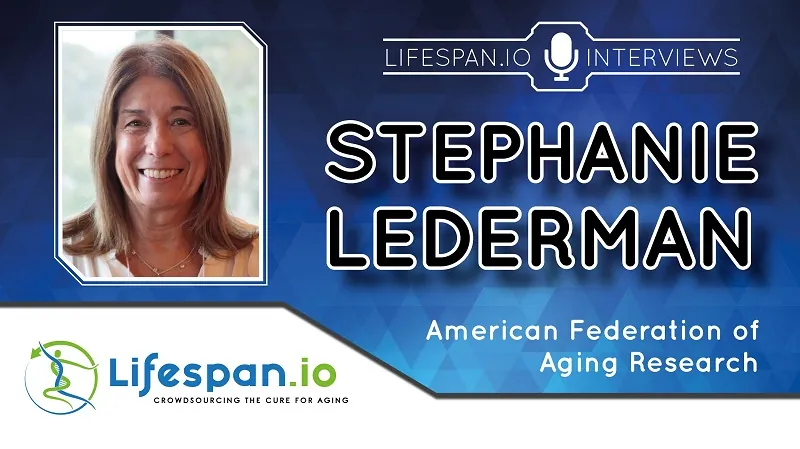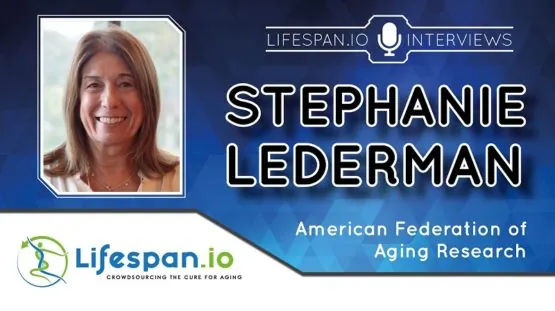Since 1992, Stephanie Lederman has been the Executive Director of the American Federation of Aging Research, which was founded back in 1981 with the mission of supporting and advancing healthy aging through biomedical research. She is a fellow of the New York Academy of Medicine and a member of the New York Academy of Sciences, and she holds a Master’s degree from Boston University.
We had the opportunity to interview Ms. Lederman at International Perspectives in Geroscience, a conference hosted at Weizmann Institute of Science (Israel) on September 4-5.
I’m happy to meet the representative of one of the oldest nonprofit organizations in our field. Before we discuss the projects of AFAR, could you please tell us what sparked your interest in this field and why did you finally choose to work with a nonprofit?
My whole career has been with nonprofits. I have an advanced degree in Public Health. My interest has always been to help the public feel healthier, not only as they age, as I’ve worked with children and youth in different areas. My career has been in a nonprofit, giving back to society, so I’ve always had an interest. I worked at one point for the American Red Cross on a health promotion program for healthy aging. Since then, I’ve became quite interested in the population, so here I am at AFAR for 25 years.
Could you please tell us about AFAR’s main activities?
Our main activities are to fund the young and inspiring and inspire young investigators to work in the field of the biology of aging. From the very beginning, although we do other things as well, we have funded over $200 million since the beginning of our first grant for the biology of aging. Back at a time people really didn’t know what that was about. Of course, we all know that it’s to understand how we age through the aging process, which will ultimately help us to delay and perhaps even eliminate many of the diseases of aging.
Funding for basic research remains one of the main concerns for our community. We understand that the pool of rejuvenation biotechnology companies is actually created by investigating the underlying mechanisms of aging and then selecting promising interventions in preclinical studies. Only then can a new biotechnology startup be formed to bring the research into human trials. Without basic science, there cannot be any science at all. However, funding for basic studies is the main thing that fundamental researchers of aging complain about most of the time. In your opinion, what are the main reasons for this situation?
I believe that the general public doesn’t quite understand the breakthroughs that have occurred in aging science. They only understand diseases, even though in many of the disease areas, like cancer, for example, there haven’t been the breakthroughs that the general public has been led to believe. I think the aging community has to do a better job of explaining what the breakthroughs have been and will be in the coming years, and only then will the general public begin to support it.
Some longevity activists are trying to use radical messaging that tries to intrigue potential supporters with a tenfold increase in lifespan instead of explaining the relationship between aging and disease along with the possibility of making the very processes of aging the actual therapeutic targets. What’s your way of overcoming the initial public skepticism about the usefulness of aging research?
I believe what we try to tell the general public is that a better world for everyone is in the picture. We don’t exaggerate what there might be; we don’t know what there might be. It’s much better to talk realistically, not negative, but realistically, so that people are unsuspicious, and they don’t think that “Oh, you’re doing this because you’re trying to sell a drug.” Or “You’re making it up because this is the fountain of youth, and we’ve heard that for thousands of years.” We at AFAR try to kind of take a middle ground so that people will believe us that aging science is a credible science. It was something that we hoped for, and now we can promise results.
What kinds of organizations or researchers are eligible for your grants’ support, and how much support are you usually able to provide to different types of grantees?
We have a range of programs, and everyone is eligible, if they have a good scientific proposal. We have peer review, but we are very interested in those proposals that are risky, because we get money from the private sector; the government takes care of those that are not as risky. So we look for those that are risky, but we do fund all over the world now. We’re looking for mainly those who are starting out; very often, it’s their breakthrough grant, and we allow them then to get more funding and be an established investigator.
What kind of topic is the most attractive for AFAR? Is there a favorite area of research, such as a focus on a specific hallmark of aging and its related conditions?
Every year, we just put out a request for proposals, and the best science gets funded. It’s different every year; we don’t really specifically say that we want something in telomeres or autophagy or anything like that; we just get whatever idea is coming at that particular time.
There is a problem that is often covered even in research papers, which is that a younger researcher has usually less chances to be funded or provided with a grant. Does this problem arise within AFAR?
We try to go for the younger investigator. Our basic mission is to fund young investigators in the biology of aging. Our founder’s premise was that we need to bring people into the field. That has always been from day one, to try to get people that need the money, if we see people that are kind of tied. The one that needs the money the most, because they’re younger or they’re not as established or they’re not in an institution that may have a lot more resources, we try to give that person the benefit of the doubt.
If you don’t mind me asking, what is the success rate of the grant applications within AFAR? What share of research gets funded, and what’s the total amount of funding that you allocate each year to aging research?
We have a two-tier process and administrative review, and that goes out to about 300 investigators to look at their one-page proposal. If it passes that, then they’re asked to come with a full proposal. Of those people that put in a full proposal, 50% get funded. If you’re looking at from the first part, there’s so many, but it’s hard to judge the percentage and we’re giving out now, in all of our grants, only about 4 or 5 million. We’ve given out more depending upon what year and what foundations; when the Ellison Foundation was supporting us, we gave out more. We’re trying to attract new foundations and new philanthropy to the field, so there’s plenty of more people that can get funded that, unfortunately, we’re not able to fund.
You’re doing a great job anyway; 5 million is a lot, especially for basic studies. I read that you participate in a program of supporting women in science, which I’m really happy about. There is a common misconception that women are less predisposed to scientific work and can’t be true leaders in their respective fields as much as men are. Your own example actually disproves that, quite obviously. Yet I often find these ideas in the air, even coming from my fellow longevity ladies. Could you please share your vision of the situation?
Yes, we’re a big believer in women in science; we have done many activities in that regard. I see the future, especially from the applications that we’re receiving and the people that we’re funding. The future is women. You know, the men have been around for a while; they’re there. Even at this conference, you could see that it was mainly men, I think there were one or two women, but the people in the audience were a majority of women. So we’re optimistic that women are being attracted to this field.
AFAR itself is actively advocating for research on aging on many levels. One such project was support for the TAME study, which investigates the potential of metformin for extending healthy lifespan in people without diabetes. Could you please tell our readers more about the advocacy projects apart from TAME?
Yes. So TAME obviously is very important because if aging is an indication, there will be new drugs. So that’s very important. But we are advocating on behalf of many scientists, we do conferences, media briefings, and webinars. If someone comes to us with an idea, we very often will try to advocate on their behalf. We’re not an advocacy organization, but we like to educate the general public, foundations, the world of philanthropy, and the government in a variety of different ways. We do a lot more than people realize, because we don’t spend a lot of money on advertising, but we’re doing a lot. People may not hear about it. The main initiative is TAME, because it’s been all over the news, but there are many other things as well.
What message would you like to share with people who are considering becoming advocates for healthy longevity or working on fundraising for science?
I would say that the science is now for this field, that it’s a relatively new field, but the excitement over the last 10 years, from what I’ve seen in the amount of time that I’ve been involved, is extremely exciting. There is a lot in the air right now. I think people could have the hope and realize the promise but without the exaggeration of living to 500. One thing I do want to add as well is that a healthier population will benefit society. If there are more older people living longer, there are many things that they could be doing to help society, They’re not a burden; they are really a prize for us, and I think we need to reap the benefits of an older population.
Is there a take-home message for our readers that you would like to offer?
I started off with the message of “A better world for older people is a better world for everyone.” I would say that it’s not just about aging. As you get older, it’s the life course. The work and the research that the field is doing right now will benefit everyone from childhood to older age. It’s not just about “Let’s find something for an old person.” It’s for everybody.





